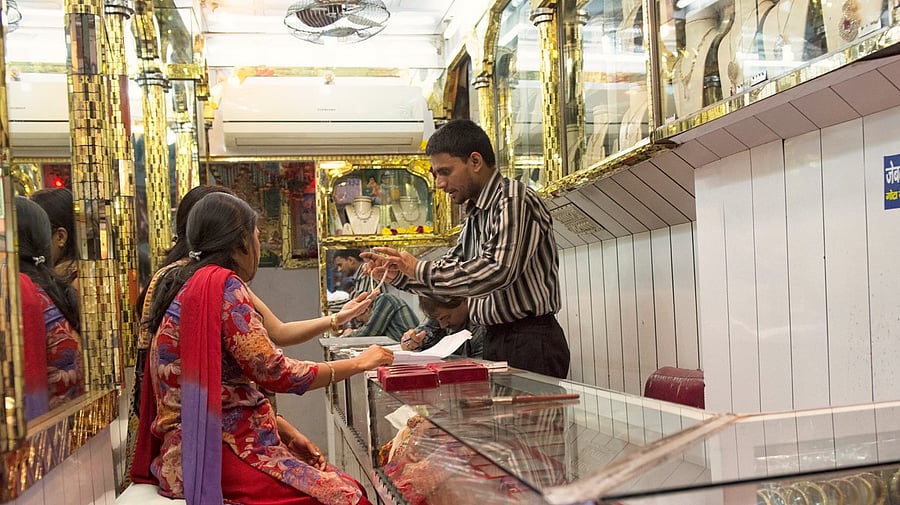
Photo for representational purpose.
Credit: iStock photo
Despite an uptick in jewellery sales, small-scale jewellers in the state are on the decline as their children are opting for other professions and the public are switching to branded jewellery.
While gold jewellery exports grew by 11.56 per cent during April-June 2024, the number of traditional goldsmiths across the state have declined by around 40 per cent over the past few years. “The number of small-scale jewellers has dropped from over 4 lakh to 2.5 lakh in the last four years,” says R Ramamurthy Vishwakarma of Bengaluru-based Karnataka Swarnakara Sangha (KSS).
Between April 2024 and June 2024, gold jewellery exports grew from $2,028.99 million to $2,263.2 million, according to the Gem and Jewellery Export Promotion Council.
Yet a sense of gloom prevails among traditional jewellery shop owners and goldsmiths across the state. “In Bengaluru, there were around 5,000 small jewellery shops and over 500 have shut shop in the past few years,” says Bangalore Jewellers Association secretary Ashok Rathod.
For the past 15 years, there has been no new induction of fresh talent into the traditional silver and gold jewellery making business in Dakshina Kannada, says Arun G Shet – a second generation gold jewellery shop owner.
“Around 75 per cent of 5,000 traditional goldsmiths working in the district have lost their jobs. Highly skilled craftsmen have been driving autorickshaws to make ends meet,” says Dakshina Kannada Chinnada Kelasagarara Sangha (DKCKS) secretary Prakash Halegi.
The gold’s glitter holds no appeal to the younger generation of artisans. Around 30 shops in Mysuru had shut down in the past 10 years as the next generation carved a different career path, said Mysuru Saraf Association (MSA) president C S Amarnath.
Kalaburagi Saraf Merchant Association president Raghavendra Mailapur said 70% of business turnover of over 400 jewellery shops was lost to branded or ‘corporate’ jewellery showrooms.
The competition by branded showrooms has had minimal impact on traditional shops in Belagavi and Mysuru. Shahapur Saraf Association secretary Santosh Kalghatgi says that customers are returning to traditional shops as branded showrooms had different policies for buyback, repair services among others.
Common facility centre
Prakash Halegi said a cluster or a common facility centre (CFC) has been proposed in Mangaluru to the Union and state governments at a cost of Rs 20 crore. With investors showing no interest, the proposal is gathering dust. With all services available under one roof, CFC would ensure plenty of work for goldsmiths, Prakash said. “Many gold jewellery works could get retained instead of being outsourced to Mumbai,” Arun Shet said and added that a tier II city like Mangaluru lacked technology to detect a fake diamond.
The reduction in custom duties on gold and silver from 15 per cent to 6 per cent enhanced affordability and boosted domestic value.
MSME joint director, Department of Commerce and Industries, Narayan K Naik told DH that the department only identifies beneficiaries. Toolkit incentive and Rs 500 stipend a day during training period is being released by National Skill Development Corporation in Peenya.
Sources in NSDC on condition of anonymity confirmed the delay in release of toolkit incentives and stipend. Due to directions from RBI, transferring stipend was put on hold for two months. Sources were confident it will be resolved soon. “Goldsmiths who clear advanced training are eligible for loans up to Rs 3 lakh,” sources said.
(With inputs from T R Sathish Kumar in Mysuru, Raju Gavali in Belagavi, Vittal Shastri in Kalaburagi and Varsha Gowda in Bengaluru).